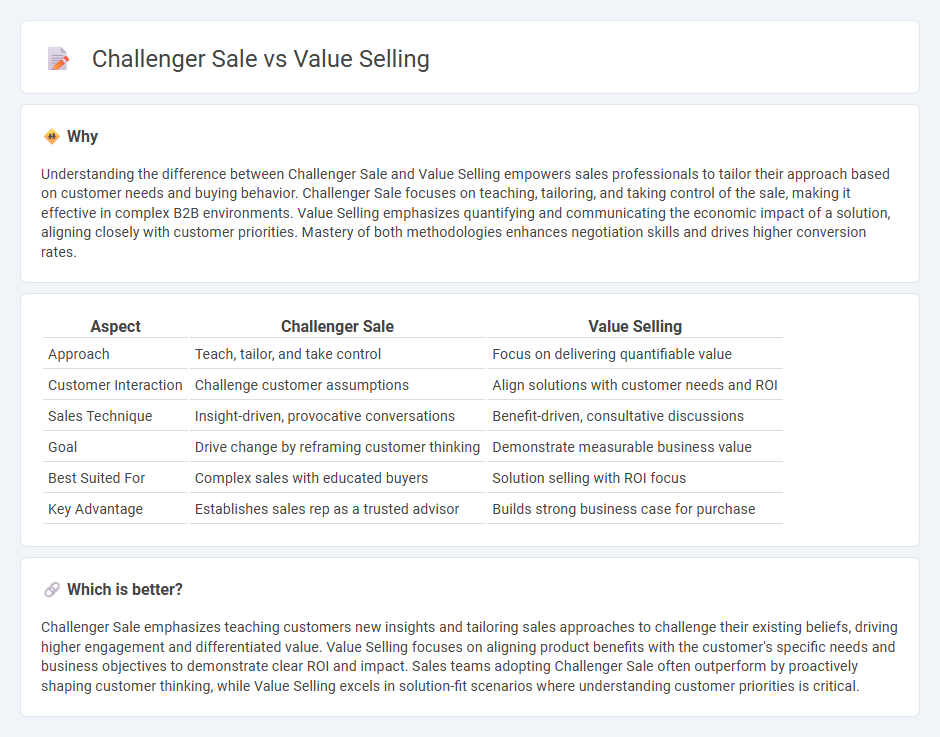
Challenger Sale focuses on teaching sales professionals to challenge customers' thinking by offering unique insights and tailored solutions, driving higher engagement and differentiation. Value Selling emphasizes demonstrating clear, quantifiable benefits and ROI to customers, ensuring solutions align closely with their business objectives and pain points. Explore the differences to determine which sales strategy best fits your organization's goals.
Why it is important
Understanding the difference between Challenger Sale and Value Selling empowers sales professionals to tailor their approach based on customer needs and buying behavior. Challenger Sale focuses on teaching, tailoring, and taking control of the sale, making it effective in complex B2B environments. Value Selling emphasizes quantifying and communicating the economic impact of a solution, aligning closely with customer priorities. Mastery of both methodologies enhances negotiation skills and drives higher conversion rates.
Comparison Table
| Aspect | Challenger Sale | Value Selling |
|---|---|---|
| Approach | Teach, tailor, and take control | Focus on delivering quantifiable value |
| Customer Interaction | Challenge customer assumptions | Align solutions with customer needs and ROI |
| Sales Technique | Insight-driven, provocative conversations | Benefit-driven, consultative discussions |
| Goal | Drive change by reframing customer thinking | Demonstrate measurable business value |
| Best Suited For | Complex sales with educated buyers | Solution selling with ROI focus |
| Key Advantage | Establishes sales rep as a trusted advisor | Builds strong business case for purchase |
Which is better?
Challenger Sale emphasizes teaching customers new insights and tailoring sales approaches to challenge their existing beliefs, driving higher engagement and differentiated value. Value Selling focuses on aligning product benefits with the customer's specific needs and business objectives to demonstrate clear ROI and impact. Sales teams adopting Challenger Sale often outperform by proactively shaping customer thinking, while Value Selling excels in solution-fit scenarios where understanding customer priorities is critical.
Connection
Challenger Sale and Value Selling are connected through their focus on delivering tailored insights that challenge customers' existing beliefs, thereby creating a higher perceived value. Both methodologies emphasize understanding customer needs deeply and positioning solutions as essential for addressing specific business challenges. This alignment drives stronger buyer engagement and increases the likelihood of closing high-impact sales deals.
Key Terms
Value Proposition
Value Selling emphasizes understanding customer needs to tailor solutions that highlight specific value propositions, enhancing perceived benefits and driving purchase decisions. Challenger Sale prioritizes teaching, tailoring, and taking control by presenting unique insights that challenge customer thinking and reshape value perceptions. Explore more to understand which sales methodology best amplifies your value proposition.
Commercial Insight
Value Selling emphasizes identifying customer needs and demonstrating how a product or service delivers measurable value, while Challenger Sale prioritizes delivering unique Commercial Insight to challenge customer assumptions and drive different thinking. Commercial Insight in the Challenger Sale involves providing customers with fresh perspectives that reshape their priorities and create urgency for change. Discover how integrating Commercial Insight can transform your sales approach and boost results.
Customer Needs
Value Selling centers on understanding and addressing explicit customer needs by delivering tailored solutions that emphasize return on investment and measurable benefits. Challenger Sale targets teaching customers new perspectives, challenging their existing assumptions to drive demand and create competitive differentiation. Explore in-depth strategies to align your sales approach with customer priorities for maximum impact.
Source and External Links
10 Fundamental Principles of Value Selling - Highspot - Value selling is a sales methodology that emphasizes helping prospects recognize the unique value of a product by focusing on benefits over features or price, aiming to demonstrate how the product provides greater value than alternatives through research, listening, educating, and quantifying benefits.
What is value selling? Techniques & Examples - Salesforce - Value selling is a strategy centered on solving customer problems while delivering positive economic impact such as cost savings, time savings, competitive advantage, and risk mitigation, building trust that leads to long-term customer relationships.
What is Value Selling? - Gong - Value selling prioritizes buyers' needs throughout the sales process, encouraging sales reps to become trusted advisors by personalizing pitches to focus on the value the product brings rather than its features, distinguishing it from solution selling.
 dowidth.com
dowidth.com